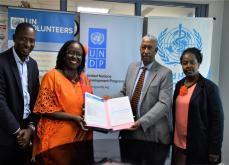On 20 September 2022, Uganda declared an Ebola virus outbreak in Mubende District in the central part of the country. As cases multiplied, the government enforced a regional lockdown to cap the Ebola virus and contain the emergency. During the outbreak, 142 confirmed cases were registered, resulting in 55 deaths and 87 recovered patients. Another 22 patients suffered symptoms deemed probable Ebola virus cases.
The UN in Uganda collaborated with the Government and other partners in addressing the health emergency. During the outbreak, more than 20 national UN Volunteers were deployed to bolster the UN response to the crisis. The UN Volunteers were mainly hosted by the World Health Organization (WHO), UN Children’s Fund (UNICEF) and a government agency, the Kampala Capital Authority. Other UN Volunteers initially recruited to support the COVID-19 response were reassigned to the response. They served alongside national and international partners, providing a range of services, including contact tracing, community outreach, health education and psychosocial support.
On 11 January 2023, the Ministry of Health and WHO declared Uganda Ebola free.
Declaring Uganda Ebola free has been a tremendous achievement for the country, and a testimony to the partnership between the Government, WHO and other stakeholders for emergency response. The UN Volunteers at the heart of the action were dedicated and qualified professionals, who, by virtue of their assignments, put themselves at risk to deliver essential health services. They were critical in responding to this outbreak, providing clinical preventive health services and psychosocial support that is highly valued. --Dr Yonas Tegegn, WHO Country Representative, Uganda
The Ebola virus emergency brought physical health challenges with it, including complications caused by debilitating conditions like HIV/AIDS. It also took a toll on the mental health and psychosocial wellbeing of patients, contacts and the community as a whole.
Some experienced psychological distress resulting from discriminatory treatment and attitudes within families and communities. Many suffered a decline in their mental wellbeing as a result of long periods of hospitalization, loss of livelihoods, deaths in the family and uncertainty about the future.
One of the positive outcomes of the epidemic is a commitment to continued provision of mental health and psychosocial care. To respond to the unique needs of Ebola survivors, the Ministry of Health, with support from WHO and other partners, established a national Ebola Survivors programme. This aims to improve access to quality health care for the Ebola survivors and established Survivor’s Clinics to addresses their medical, mental and psychosocial challenges.
The case of the Ebola outbreak in Uganda highlights the importance of investing in preparedness and response. It also underscores the critical role that skilled and experienced UN Volunteers can play in responding to emergencies. The lessons learned here will be critical in informing future preparedness and response efforts and recognizing the value of engaging volunteer talent. --Yuichiro Sakai, Regional Portfolio Specialist, UNV East and Southern Africa
Among the UN Volunteers were Nurses and Infection Prevention Control, Psychosocial Support, Case Management and Risk Communication Officers.
For World Health Day, a few of these UN Volunteers share their journey during this challenging phase and how their contribution made a difference in the lives of those affected by the Ebola virus in Uganda.
Read more about UN Volunteers helping patients and families recover from Ebola virus infection; excerpt:
My role is to provide mental health and psychosocial support services to Ebola survivors within the Survivor’s Clinic established by WHO, the Government and partners. I raise community awareness and sensitize on the Ebola virus, while also identifying and development technical aspects of the programme. --Arinaitwe Mary Immaculate, Psychosocial Support Officer with WHO, Uganda
UN Volunteers also shared how they are enabling contact tracing and infection control in the Ebola crisis; excerpt:
We rejoiced after my country was declared free of Ebola. Of the 87 survivors, 19 are being reviewed by the Entebbe Survivor’s Clinic, where we nursed 13 adults and six children. It is gratifying to see their progress at their regular visits to our facility. --Caroline Olyet Anyango, UN Volunteer Case Management Nurse with WHO, Uganda

